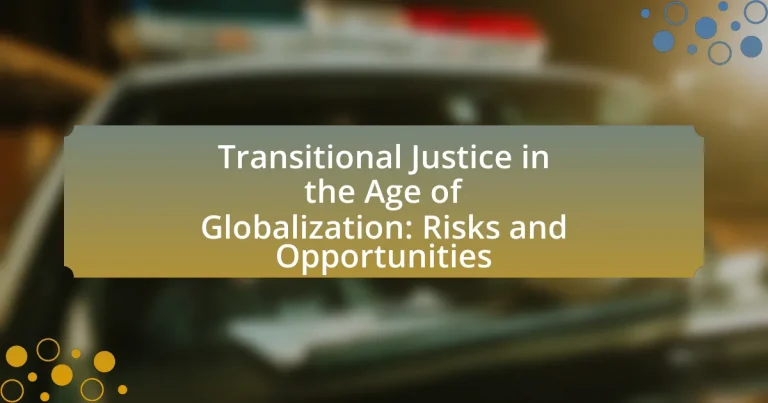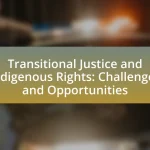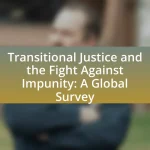Transitional justice in the age of globalization encompasses the processes and mechanisms societies use to address past human rights violations while promoting accountability, reconciliation, and healing. This article examines how globalization influences transitional justice by facilitating the exchange of ideas, practices, and resources, enhancing local efforts through international cooperation and advocacy. Key elements such as truth-seeking, accountability, reparations, and institutional reform are discussed, alongside the impact of international norms on local initiatives. The article also highlights the risks associated with neglecting local contexts, the politicization of justice processes, and the potential pitfalls of imposing external models. Additionally, it explores opportunities presented by globalization, including technological advancements and shared experiences that can inform best practices in transitional justice.
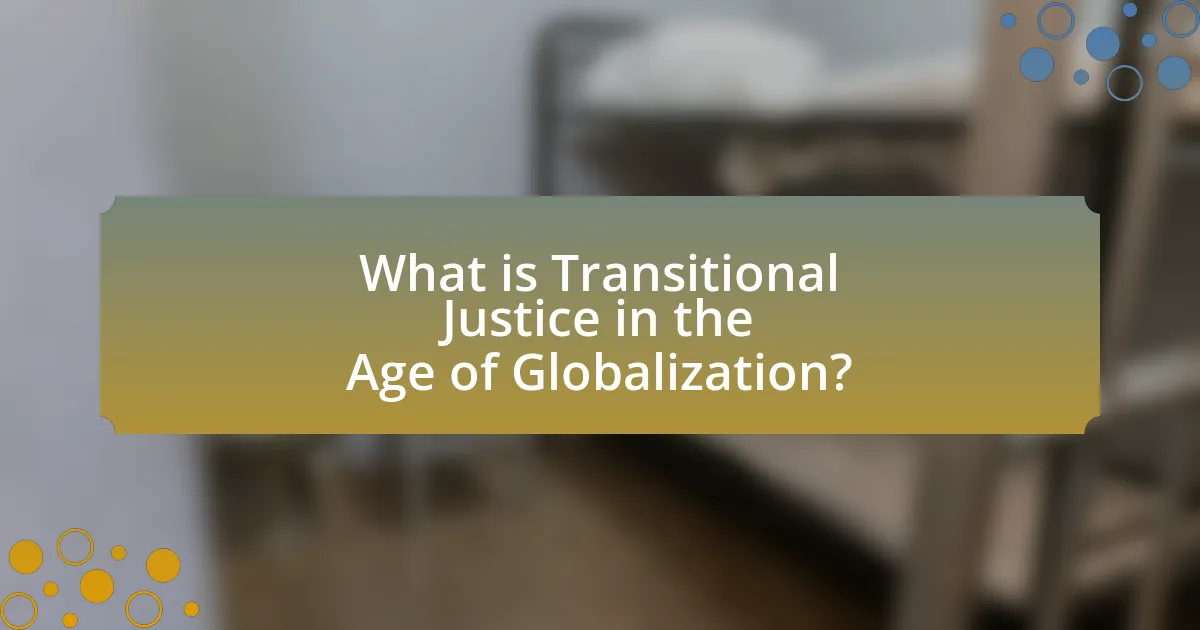
What is Transitional Justice in the Age of Globalization?
Transitional justice in the age of globalization refers to the processes and mechanisms employed by societies to address past human rights violations and promote accountability, reconciliation, and healing in a global context. This concept has evolved as globalization facilitates the exchange of ideas, practices, and legal frameworks across borders, allowing for a more interconnected approach to justice. For instance, international tribunals and hybrid courts, such as the International Criminal Court, exemplify how global cooperation can enhance local efforts in transitional justice by providing legal standards and support. Additionally, the rise of global civil society organizations has amplified the voices of victims and advocates, influencing national policies and promoting universal human rights norms.
How does globalization impact transitional justice processes?
Globalization significantly impacts transitional justice processes by facilitating the exchange of ideas, practices, and resources across borders, which can enhance the effectiveness of these processes. For instance, international legal frameworks and norms, such as the Rome Statute of the International Criminal Court, promote accountability for human rights violations globally, influencing domestic transitional justice initiatives. Additionally, globalization enables the mobilization of transnational advocacy networks that pressure governments to implement justice measures, as seen in various post-conflict societies where international organizations have played a crucial role in shaping local policies. This interconnectedness can also lead to the sharing of best practices and lessons learned from different contexts, thereby improving the design and implementation of transitional justice mechanisms.
What are the key elements of transitional justice in a global context?
The key elements of transitional justice in a global context include truth-seeking, accountability, reparations, and institutional reform. Truth-seeking mechanisms, such as truth commissions, aim to uncover the facts about past human rights violations, fostering public acknowledgment and understanding. Accountability is pursued through legal processes that hold perpetrators of crimes accountable, often involving trials or other judicial measures. Reparations provide compensation and recognition to victims, addressing the harm they suffered and promoting healing. Institutional reform focuses on restructuring state institutions, such as the police and judiciary, to prevent future abuses and ensure respect for human rights. These elements are essential for societies transitioning from conflict or authoritarian rule, as evidenced by various global cases, including South Africa’s Truth and Reconciliation Commission and the International Criminal Court’s efforts to prosecute war crimes.
How do international norms influence local transitional justice efforts?
International norms significantly influence local transitional justice efforts by providing frameworks and standards that guide the processes of accountability, truth-telling, and reparations. These norms, established through international treaties, conventions, and customary law, create expectations for how societies should address past human rights violations. For instance, the United Nations’ Basic Principles and Guidelines on the Right to a Remedy and Reparation outline the obligations of states to provide justice for victims, which local efforts often reference to legitimize their actions. Additionally, international norms can shape local policies by encouraging the adoption of best practices, such as inclusive participation of victims in transitional processes, thereby enhancing the legitimacy and effectiveness of local justice initiatives.
Why is transitional justice important in contemporary societies?
Transitional justice is important in contemporary societies because it addresses the legacies of past human rights violations and promotes accountability, reconciliation, and the rule of law. By facilitating processes such as truth commissions, reparations, and legal prosecutions, transitional justice helps societies confront their histories, thereby fostering healing and preventing future conflicts. For instance, countries like South Africa and Rwanda have implemented transitional justice mechanisms that have contributed to national healing and stability post-conflict, demonstrating its effectiveness in rebuilding trust among communities.
What role does transitional justice play in post-conflict reconciliation?
Transitional justice plays a critical role in post-conflict reconciliation by addressing past human rights violations and fostering accountability. It facilitates the healing process for victims and communities by acknowledging their suffering, which is essential for rebuilding trust and social cohesion. For instance, mechanisms such as truth commissions and reparations have been implemented in countries like South Africa and Rwanda, where they contributed to national healing and the establishment of a shared narrative about the past. These processes not only promote justice but also help prevent the recurrence of violence by creating a historical record that discourages impunity.
How does transitional justice contribute to the rule of law and human rights?
Transitional justice contributes to the rule of law and human rights by establishing accountability for past abuses, thereby reinforcing legal frameworks and promoting societal trust in institutions. By addressing grievances through mechanisms such as truth commissions, reparations, and criminal prosecutions, transitional justice helps to dismantle impunity and ensures that victims’ rights are recognized and upheld. For instance, the International Criminal Court has prosecuted individuals for war crimes and crimes against humanity, which serves as a deterrent against future violations and strengthens the rule of law. Additionally, successful transitional justice processes, such as those in South Africa and Rwanda, have demonstrated that acknowledging past injustices can foster reconciliation and support the development of human rights norms within societies emerging from conflict.
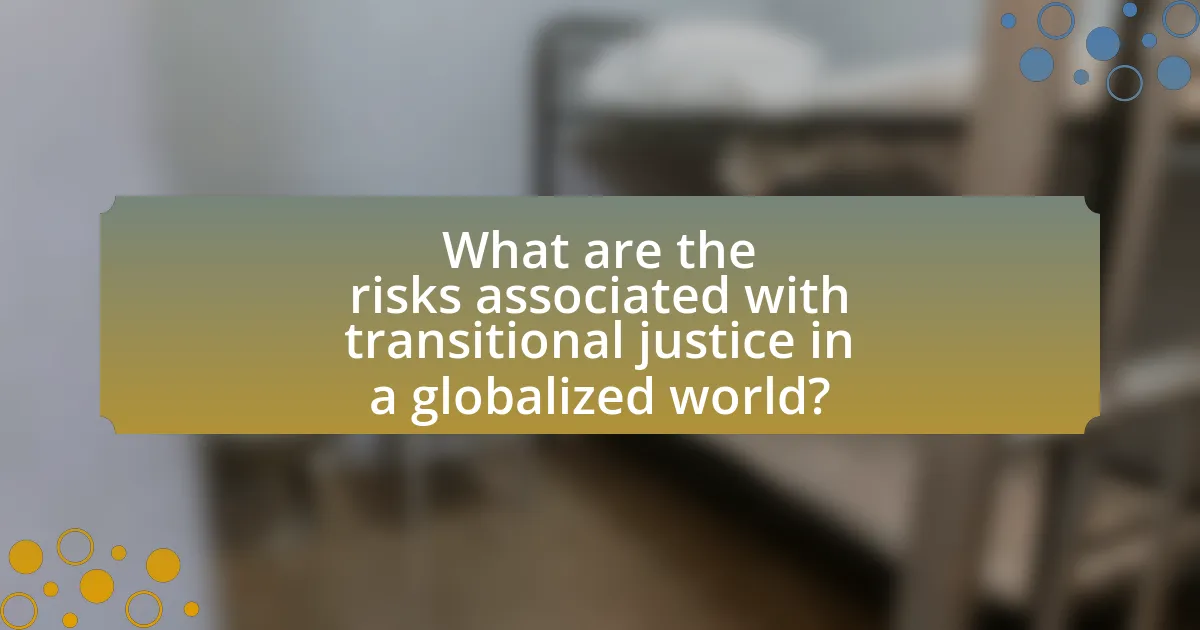
What are the risks associated with transitional justice in a globalized world?
The risks associated with transitional justice in a globalized world include the potential for undermining local contexts, the imposition of external norms, and the risk of selective justice. Transitional justice mechanisms, such as truth commissions and trials, may not adequately consider the unique historical and cultural contexts of affected societies, leading to ineffective or inappropriate solutions. Additionally, external actors, including international organizations and foreign governments, may impose their own standards and practices, which can conflict with local needs and priorities, resulting in resistance or backlash from local populations. Furthermore, selective justice can occur when transitional justice processes focus on certain perpetrators while ignoring others, potentially perpetuating cycles of violence and resentment. These risks highlight the complexities of implementing transitional justice in a globalized environment, where local and international dynamics intersect.
How can globalization exacerbate challenges in transitional justice?
Globalization can exacerbate challenges in transitional justice by creating disparities in power dynamics and complicating accountability mechanisms. As nations become more interconnected, the influence of multinational corporations and foreign governments can overshadow local justice efforts, leading to a lack of support for victims’ rights. For instance, in post-conflict societies, external actors may prioritize stability and economic interests over genuine justice, undermining local initiatives aimed at addressing past atrocities. This dynamic can result in a failure to hold perpetrators accountable, as seen in cases where international actors have shielded allies from prosecution to maintain strategic partnerships.
What are the potential pitfalls of international involvement in local justice processes?
International involvement in local justice processes can lead to several potential pitfalls, including undermining local legitimacy, creating dependency, and imposing foreign values. When international actors intervene, they may inadvertently delegitimize local systems by suggesting that they are inadequate, which can erode public trust in domestic institutions. For instance, in post-conflict societies, reliance on international tribunals can foster a dependency that stifles the development of local judicial capacities. Additionally, the imposition of foreign legal frameworks may clash with cultural norms and values, leading to resistance and further complicating the justice process. These pitfalls highlight the complexities and challenges of integrating international support within local contexts.
How does the politicization of transitional justice affect its effectiveness?
The politicization of transitional justice significantly undermines its effectiveness by compromising impartiality and fostering selective accountability. When political interests influence transitional justice processes, they often prioritize the needs of specific groups over comprehensive justice, leading to a lack of trust among affected communities. For instance, in countries like Argentina and South Africa, political agendas have shaped the narratives around truth commissions, resulting in incomplete historical accounts and unaddressed grievances. This selective approach can perpetuate cycles of violence and hinder reconciliation, as marginalized groups may feel excluded from the justice process, ultimately diminishing the legitimacy and impact of transitional justice initiatives.
What are the risks of neglecting local contexts in transitional justice?
Neglecting local contexts in transitional justice can lead to ineffective or harmful outcomes, including the perpetuation of existing inequalities and the alienation of affected communities. When transitional justice mechanisms do not consider the specific historical, cultural, and social dynamics of a locality, they risk imposing external solutions that may not resonate with the needs or values of the community. For instance, the failure to address local grievances can result in a lack of legitimacy for transitional justice processes, as seen in cases like the post-apartheid South Africa, where some communities felt marginalized by national reconciliation efforts. Additionally, overlooking local contexts can exacerbate tensions and conflict, as communities may perceive transitional justice as a tool of oppression rather than a means of healing. This highlights the importance of integrating local perspectives to ensure that transitional justice is relevant, accepted, and effective in fostering sustainable peace and justice.
How can a lack of local ownership undermine transitional justice initiatives?
A lack of local ownership can undermine transitional justice initiatives by creating a disconnect between the processes and the affected communities, leading to diminished legitimacy and effectiveness. When local populations do not feel a sense of ownership over transitional justice mechanisms, they are less likely to engage with or support these initiatives, which can result in resistance or apathy. For instance, studies have shown that successful transitional justice efforts, such as those in South Africa, relied heavily on local participation and buy-in, which fostered trust and accountability. Conversely, initiatives imposed without local input, like some in post-conflict countries, often face challenges in implementation and acceptance, ultimately hindering their goals of reconciliation and justice.
What are the consequences of imposing external models of justice?
Imposing external models of justice can lead to significant cultural dissonance and undermine local legal systems. When external frameworks are applied without consideration of local contexts, they may provoke resistance from communities, erode trust in institutions, and exacerbate existing social tensions. For instance, in post-conflict societies, the introduction of foreign legal standards can clash with traditional practices, resulting in a lack of legitimacy and acceptance among the populace. Historical examples, such as the imposition of Western legal systems in Afghanistan, illustrate how such actions can lead to increased instability and conflict rather than resolution.
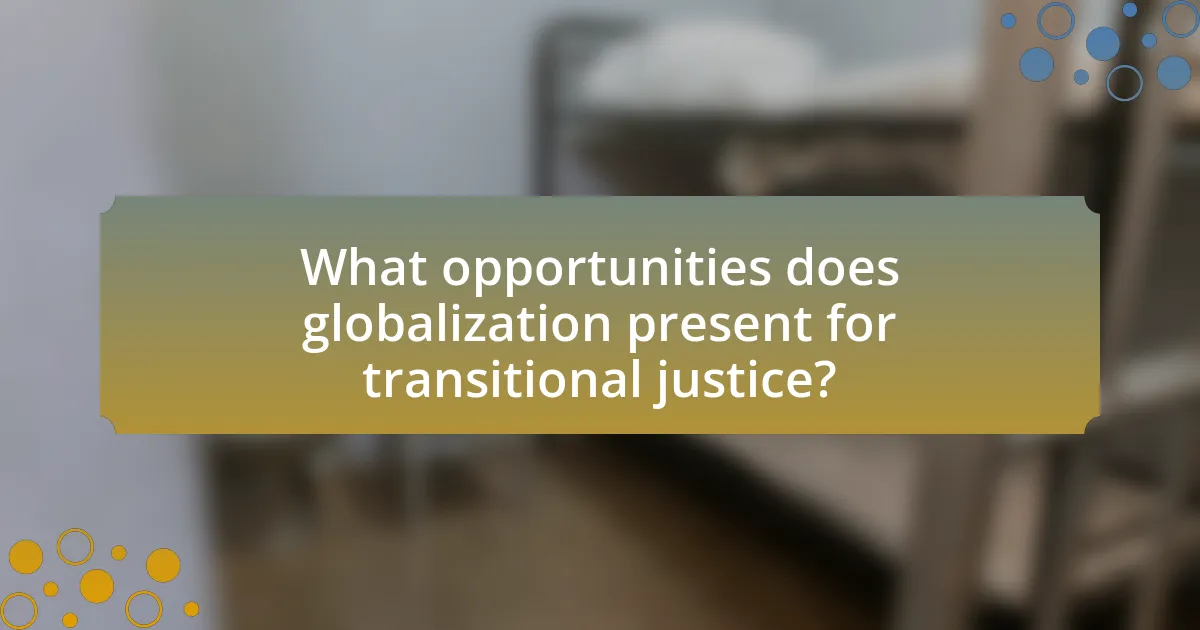
What opportunities does globalization present for transitional justice?
Globalization presents opportunities for transitional justice by facilitating international cooperation and the sharing of best practices among nations. This interconnectedness allows countries emerging from conflict or authoritarian rule to learn from each other’s experiences in implementing justice mechanisms, such as truth commissions and reparations programs. For instance, the establishment of the International Criminal Court (ICC) exemplifies how global frameworks can support national efforts to hold perpetrators accountable, thereby reinforcing the rule of law. Additionally, globalization enhances access to information and resources, enabling local actors to engage with international human rights organizations, which can provide technical assistance and advocacy for justice initiatives.
How can international cooperation enhance transitional justice efforts?
International cooperation can enhance transitional justice efforts by providing resources, expertise, and a platform for accountability. Collaborative initiatives, such as those led by the United Nations, facilitate the sharing of best practices and lessons learned from various contexts, which can improve the effectiveness of transitional justice mechanisms. For instance, the International Criminal Court (ICC) relies on cooperation from states to enforce its mandates, thereby promoting accountability for war crimes and crimes against humanity. Additionally, international partnerships can mobilize funding and technical assistance, as seen in post-conflict countries like Rwanda, where international support has been crucial in establishing local tribunals and reconciliation processes. This collective approach not only strengthens the legitimacy of transitional justice efforts but also fosters a global commitment to human rights and the rule of law.
What role do international organizations play in supporting local justice initiatives?
International organizations play a crucial role in supporting local justice initiatives by providing funding, expertise, and frameworks for legal reform. They facilitate capacity building through training programs for local legal professionals, ensuring that justice systems are equipped to handle transitional justice issues effectively. For instance, the United Nations Development Programme has implemented projects in various countries to strengthen local judicial capacities, which has led to improved access to justice for marginalized communities. Additionally, international organizations often promote best practices and standards, such as those outlined in the UN’s Basic Principles and Guidelines on the Right to a Remedy, which guide local initiatives in aligning with international human rights norms.
How can shared experiences from different countries inform best practices?
Shared experiences from different countries can inform best practices by providing diverse perspectives on transitional justice mechanisms. For instance, countries like South Africa and Rwanda have implemented unique approaches to reconciliation and accountability that can serve as models for others facing similar challenges. The Truth and Reconciliation Commission in South Africa, established in 1995, emphasized restorative justice and public testimony, which has been studied and adapted by various nations seeking to address past atrocities. Similarly, Rwanda’s Gacaca courts, which focused on community-based justice, have been analyzed for their effectiveness in promoting healing and social cohesion post-genocide. These examples illustrate how countries can learn from each other’s successes and failures, leading to more effective and culturally relevant transitional justice practices.
What technological advancements can aid transitional justice?
Technological advancements such as digital documentation, data analytics, and blockchain can significantly aid transitional justice. Digital documentation allows for the systematic collection and preservation of evidence related to human rights violations, enhancing accountability. Data analytics can identify patterns of abuse and support informed decision-making in justice processes, as seen in the use of big data by organizations like the International Criminal Court. Blockchain technology ensures the integrity and transparency of records, making it difficult to alter evidence, which is crucial for building trust in transitional justice mechanisms.
How can digital platforms facilitate documentation and awareness of human rights abuses?
Digital platforms can facilitate documentation and awareness of human rights abuses by providing accessible channels for reporting incidents, sharing information, and mobilizing public support. These platforms enable victims and witnesses to document abuses in real-time, often through social media or dedicated human rights apps, which can lead to immediate visibility and response. For instance, the use of Twitter during the Arab Spring allowed for rapid dissemination of information regarding human rights violations, garnering international attention and prompting action from global organizations. Additionally, platforms like Amnesty International’s Digital Verification Corps utilize crowdsourcing to verify and archive evidence of abuses, ensuring that documentation is credible and can be used in legal contexts. This combination of real-time reporting and verified documentation enhances awareness and can lead to accountability for perpetrators.
What are the benefits of using technology for community engagement in transitional justice?
The benefits of using technology for community engagement in transitional justice include enhanced communication, increased accessibility, and improved data collection. Technology facilitates real-time dialogue between communities and justice mechanisms, allowing for broader participation and input from diverse groups. For instance, platforms like social media and mobile applications enable marginalized voices to be heard, fostering inclusivity in the transitional justice process. Additionally, technology can streamline the collection of testimonies and evidence, making it easier to document human rights violations. Research by the United Nations Development Programme highlights that digital tools can significantly improve public awareness and engagement, ultimately leading to more effective and responsive transitional justice initiatives.
What best practices can be adopted for effective transitional justice?
Effective transitional justice can be achieved through several best practices, including inclusive participation, accountability mechanisms, and victim-centered approaches. Inclusive participation ensures that all stakeholders, particularly marginalized groups, have a voice in the transitional justice process, fostering legitimacy and trust. Accountability mechanisms, such as trials and truth commissions, are essential for addressing past atrocities and deterring future violations, as evidenced by the success of the South African Truth and Reconciliation Commission in promoting national healing. Additionally, victim-centered approaches prioritize the needs and rights of victims, ensuring they receive reparations and recognition, which is crucial for restoring dignity and promoting social cohesion. These practices collectively enhance the effectiveness of transitional justice by addressing the root causes of conflict and fostering sustainable peace.
How can stakeholder engagement improve the outcomes of transitional justice processes?
Stakeholder engagement can significantly improve the outcomes of transitional justice processes by fostering inclusivity and ensuring that diverse perspectives are considered. When stakeholders, including victims, community leaders, and civil society organizations, actively participate, the processes become more representative and responsive to the needs of affected populations. Research indicates that inclusive approaches lead to greater legitimacy and public trust in transitional justice mechanisms, as seen in the case of South Africa’s Truth and Reconciliation Commission, which involved various stakeholders and contributed to national healing and reconciliation. Engaging stakeholders also enhances the identification of local grievances and solutions, ultimately leading to more effective and sustainable justice outcomes.
What strategies can ensure the sustainability of transitional justice initiatives?
To ensure the sustainability of transitional justice initiatives, it is essential to integrate local communities into the process, fostering ownership and participation. Engaging local stakeholders not only enhances legitimacy but also ensures that the initiatives are culturally relevant and address the specific needs of the affected populations. For example, the Truth and Reconciliation Commission in South Africa successfully involved communities in dialogue, which contributed to its long-term impact and acceptance. Additionally, securing ongoing funding and political support is crucial; initiatives that lack financial resources or governmental backing often struggle to maintain momentum. Research indicates that sustained funding from both domestic and international sources can significantly enhance the durability of transitional justice efforts. Lastly, establishing mechanisms for accountability and monitoring can help maintain public trust and ensure that the objectives of transitional justice are met over time.
